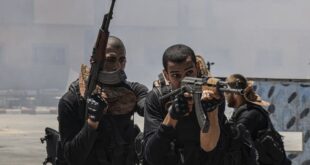 BEIT HANOUN (AP) — Israel will keep targeting Palestinian rocket squads in Gaza despite the risk of inadvertently hitting civilians, Israeli Prime Minister Ehud Olmert said Thursday, as tens of thousands of Palestinians buried 18 victims of an errant Israeli artillery strike.
BEIT HANOUN (AP) — Israel will keep targeting Palestinian rocket squads in Gaza despite the risk of inadvertently hitting civilians, Israeli Prime Minister Ehud Olmert said Thursday, as tens of thousands of Palestinians buried 18 victims of an errant Israeli artillery strike.
Women collapsed in grief, fighters fired in the air and a man hoisted his dead baby aloft during the funeral procession in the northern Gaza border town of Beit Hanoun, where several Israeli shells struck a residential area early Wednesday. All of the dead belonged to a single extended family.
The Israeli military confirmed Thursday evening for the first time that its artillery caused the casulaties, suspending the shelling.
Amid the anguish, moderate Palestinian President Mahmoud Abbas picked up the phone and called his main political rival, Hamas’ supreme leader Khaled Mishaal — a move that could help prevent the Islamic group from renewing attacks on Israel and also pave the way for a moderate Palestinian government.
Mustafa Barghouthi, an independent politician who is involved in the Fateh-Hamas talks, said late Thursday that the basic agreement is in place, but announcing the makeup of the new coalition “needs a few weeks.” Abbas and Mishaal, who lives in exile in Damascus, Syria, agreed to meet after agreement has been reached on a new government of experts, to be appointed by Hamas and Abbas’ Fateh movement, said a senior Palestinian official who sat in on the conversation. Both sides hope that such a government will be acceptable to the West and end a crippling international aid boycott.
Abbas had refused to talk to Mishaal since April, when the Hamas leader harshly criticised the Palestinian president in a speech. However, with violence threatening to escalate further after the Beit Hanoun strike and fighters calling for revenge, he contacted Mishaal to try to lock up a coalition deal. A key sticking point is the choice of a new prime minister who has ties to Hamas, but would also be acceptable to the West.
In Jerusalem, Olmert said that while he regrets the latest deaths, Israel will press ahead with strikes against Palestinian fighters firing rockets at Israeli border towns.
“The military will continue as long as there will be Qassam shooting,” he said, using the name for Hamas’ homemade rockets. “We are not going to stop,” indicating Israel would keep up its air strikes in Gaza aimed at fighters even with the artillery falling silent for now.
“We will take precautions in order to avoid unnecessary mistakes,” he said.
“We will do everything in our power to avoid it. I think it would not be serious to promise that it may not happen. It may happen.” Olmert said the artillery was meant to hit an orange grove from which troops saw rockets fired seconds earlier, but instead hit homes in Beit Hanoun, some 500 metres away.
The military said the results of its inquiry concluded that “the Palestinian civilian casualties were caused by IDF [Israeli army] artillery.” The military statement said the inquiry determined the problem was a “technical failure” in the system that directs the fire. It said the army commander ordered a halt to artillery fire at Gaza until a further check is completed.
The defence ministry said in a statement that Defence Minister Amir Peretz ordered the military to “reevaluate its policy of artillery fire in Gaza, including the safety range”. Beit Hanoun has been the focus of a weeklong Israeli offensive meant to halt the rocket attacks. Wednesday’s shelling came a day after Israeli ground forces pulled out of Beit Hanoun.
The shells landed as residents were still asleep, and witnesses said many were killed as they fled their homes in panic. The 18 dead was the highest Palestinian civilian toll in a single incident since the current conflict erupted in September 2000. The highest toll of Israeli civilians was 29 killed in a Palestinian suicide bombing at a Passover gathering in March 2002.
In Thursday’s funeral, the bodies arrived at the cemetery in a convoy of 18 ambulances which drove from the local hospital through the artillery-scarred cluster of apartment buildings. Cries of “God is greater than Israel and America,” punctuated by gunshots, rang out as the bodies were brought out on stretchers.
“I will avenge, I will avenge!” screamed one of the victims’ relatives as he fired his weapon, voicing a common sentiment among the mourners.
“The Zionist enemy understands only the language of force and therefore I say, ‘an eye for an eye, a nose for a nose,”‘ chanted Abdel Hakim Awad, a Fateh spokesman.
“The residents of Sderot, the residents of Ashkelon, even the residents of Tel Aviv, are not going to enjoy security or peace as long as you are suffering, our beloved people in Beit Hanoun.” The freshly dug graves were lined up in a single row, each marked by a concrete block. A Palestinian flag fluttered over each one.
Two Israeli unmanned aircraft buzzed overhead.
All of the dead belonged to the Athamnas, a prominent family in town that includes several doctors and professionals. Family members said they had fled during the recent Israeli offensive, returning home after Tuesday’s pullout.
The UN Security Council was to meet in special session later Thursday. Palestinians hoped for a condemnation of Israel, on top of the denunciations Israel absorbed from governments worldwide after the attack.
Israeli police, fearing revenge attacks, stepped up their alert level, mobilizing forces across the country.Â
 Eurasia Press & News
Eurasia Press & News
